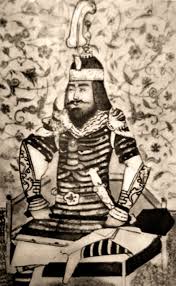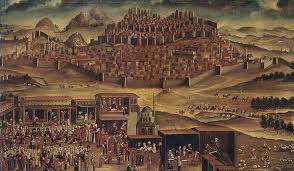Your basket is currently empty!
Introduction
The Battle of Ankara, fought on July 20, 1402, was a dramatic clash between two of the most powerful rulers of the medieval Islamic world: Timur (Tamerlane), the Central Asian conqueror, and Bayezid I, the ambitious Ottoman Sultan. The outcome of this battle would temporarily halt Ottoman expansion and reshape the balance of power in the region.
Background: Rising Powers on a Collision Course
By the early 15th century, both the Timurid Empire and the Ottoman Empire were rapidly expanding.
-
Timur had carved out a massive empire stretching from Persia to India.
-
Bayezid I, nicknamed “Yıldırım” (the Thunderbolt), had brought most of Anatolia under Ottoman rule and had pushed deep into the Balkans.
Their empires were bound to clash. Bayezid’s annexation of former Seljuk beyliks—many of which had previously acknowledged Timur’s supremacy—created tension. Diplomatic exchanges grew hostile, and both rulers began mobilizing for war.
Prelude to Battle: Strategic Moves and Miscalculations

Timur’s invasion of Anatolia in 1402 was swift and well-planned. He exploited the discontent of the Anatolian beyliks, who resented Ottoman domination, and promised to restore their autonomy.
Bayezid, who had just laid siege to Constantinople, lifted the siege and marched east to confront Timur. But Timur had the advantage of:
-
Superior mobility and tactical cavalry units
-
Alliances with local powers
-
Experience in open-field warfare
The Battle of Ankara: July 20, 1402
The two armies met near Ankara. While the Ottomans were well-equipped, they faced several challenges:
-
Exhaustion and lack of water during a brutal Anatolian summer
-
Defections by Turkish auxiliaries from Anatolia, who switched sides mid-battle
-
Timur’s scorched-earth tactics, which weakened Ottoman logistics
Timur’s forces surrounded Bayezid’s troops and launched coordinated cavalry assaults. Ottoman lines broke under pressure. Bayezid fought valiantly but was eventually captured.
Bayezid I Captured: A Shock to the Muslim World
Sultan Bayezid’s capture and imprisonment stunned the Islamic world. He was reportedly kept in a gilded cage, though some sources suggest he was treated with a mix of respect and humiliation. He died in captivity in 1403.
Aftermath: Fragmentation and Delay of Ottoman Expansion
The consequences of the battle were immediate and far-reaching:
-
The Ottoman Empire collapsed into civil war, known as the Ottoman Interregnum (1402–1413), with Bayezid’s sons fighting for control.
-
Timur reinstalled the Anatolian beyliks, effectively breaking Ottoman dominance in central Anatolia.
-
Despite his victory, Timur did not advance into Europe. He turned eastward, dying three years later during a campaign against the Ming Dynasty in China.
Long-Term Impact of the Battle of Ankara
Though Timur won the battle, it was a short-lived triumph. His empire fractured after his death, while the Ottomans, under Mehmed I, eventually reunified and resumed their expansion.
The Battle of Ankara is one of the few major defeats in early Ottoman history. It temporarily halted their European ambitions and highlighted the dangers of overextension and internal instability.
Legacy of the Battle
Historians view the Battle of Ankara as:
-
A rare instance of Ottoman defeat before the modern era
-
A demonstration of Timur’s military genius and political cunning
-
A battle that changed the trajectory of Islamic geopolitics in the 15th century

